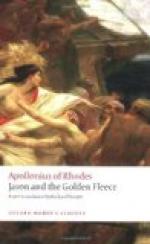“Aeetes, that ship forthwith stormy blasts tore asunder, and ourselves, crouching on the beams, a wave drove on to the beach of the isle of Enyalius[1] in the murky night; and some god preserved us. For even the birds of Ares that haunted the desert isle beforetime, not even them did we find. But these men had driven them off, having landed from their ship on the day before; and the will of Zeus taking pity on us, or some fate, detained them there, since they straightway gave us both food and clothing in abundance, when they heard the illustrious name of Phrixus and thine own; for to thy city are they faring. And if thou dost wish to know their errand, I will not hide it from thee. A certain king, vehemently longing to drive this man far from his fatherland and possessions, because in might he outshone all the sons of Aeolus, sends him to voyage hither on a bootless venture; and asserts that the stock of Aeolus will not escape the heart-grieving wrath and rage of implacable Zeus, nor the unbearable curse and vengeance due for Phrixus, until the fleece comes back to Hellas. And their ship was fashioned by Pallas Athena, not such a one as are the ships among the Colchians, on the vilest of which we chanced. For the fierce waves and wind broke her utterly to pieces; but the other holds firm with her bolts, even though all the blasts should buffet her. And with equal swiftness she speedeth before the wind and when the crew ply the oar with unresting hands. And he hath gathered in her the mightiest heroes of all Achaea, and hath come to thy city from wandering far through cities and gulfs of the dread ocean, in the hope that thou wilt grant him the fleece. But as thou dost please, so shall it be, for he cometh not to use force, but is eager to pay thee a recompense for the gift. He has heard from me of thy bitter foes the Sauromatae, and he will subdue them to thy sway. And if thou desirest to know their names and lineage I will tell thee all. This man on whose account the rest were gathered from Hellas, they call Jason, son of Aeson, whom Cretheus begat. And if in truth he is of the stock of Cretheus himself, thus he would be our kinsman on the father’s side. For Cretheus and Athamas were both sons of Aeolus; and Phrixus was the son of Athamas, son of Aeolus. And here, if thou hast heard at all of the seed of Helios, thou dost behold Augeias; and this is Telamon sprung from famous Aeacus; and Zeus himself begat Aeacus. And so all the rest, all the comrades that follow him, are the sons or grandsons of the immortals.”
[Footnote 1: A name of Ares.]
Such was the tale of Argus; but the king at his words was filled with rage as he heard; and his heart was lifted high in wrath. And he spake in heavy displeasure; and was angered most of all with the son of Chalciope; for he deemed that on their account the strangers had come; and in his fury his eyes flashed forth beneath his brows:




